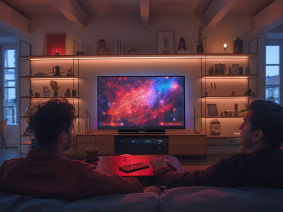Selected at the last Berlinale in the Panorama section, Anthony Lapia's first feature film, After, will be released in cinemas on September 25, 2024. One night, a techno club in an underground parking lot. Young people dance like there's no tomorrow, the music taking everything in its path.
After will be released in cinemas from September 25, 2024.
Synopsis: One night in a techno club. Young people dance like there's no tomorrow, and the music takes everything in its path. When Félicie meets Saïd, she invites him to continue the evening at her place, at the after-party.
Anthony Lapia 's long, captivating introductory scene, in which he blends in with the partygoers, succeeds in pinpointing the details of the night, the partying, the dancing, the carefree attitude to industrial techno - by Panzer, head of the Intervision label - the kind that washes away sins and unclogs pores.
A moment out of time, the camera glued to bodies, faces and sweaty figures, eyes closed in communion or pleasure. And then, the closeness, the energy that runs through the bodies, the words covered by the kicks, the wet embraces and the substances that pass from hands to nostrils.
While the low budget of this first film (€60,000) may justify, or even excuse, the grainy image and thewillingly documentary aspect of this resolutely contemporary work, we need to look beyond that, in our desire to capture the party as it is, stripped bare like this grainy image. Once this first third of the film is over, the floor is suddenly taken back to the smoking room. It's here that Félicie(Louise Chevillotte) meets Saïd(Majd Mastoura) and invites him to continue the evening at her place, one-on-one, at the after-party.
The public - albeit underground - party gives way to an intimate encounter for two, a chemical dizziness that leads to societal debates between these two people who were never predisposed to meet. She's a criminal lawyer, eager to tell him about her early experiences; he's a VTC driver (he still wears his white work shirt in the club), more reserved but happy to detail his activism.
With grace, Anthony Lapia opts for a minimalist staging, leaving room for late-night discussions. From an assessment of the nightlife world ("It's always the same, people are stoned, your mates are outrageous, you have to deal with them. I don't really believe in it anymore, you meet lots of people with whom you share lots of things, but you don't remember anything. Energy is too volatile, it almost doesn't exist.") to an unapologetic observation on justice, the climate, neo-liberalism "which has won" by "screwing us with comfort", the two night owls speak as if nothing could stop them, leaving us spectators of these exchanges facilitated by substances that loosen tongues, but which in the end turn out to be so rightly topical.
And then, as if by magic, the party reappears in the picture, as the film moves back and forth between the apartment and the underground parking lot , where the near-naked bodies become one, without ever descending into scabrous night. The film culminates in a beautiful scene featuring Anika's magnetic cover of The Kinks' I Go To Sleep, played over Félicie's speakers and spilling out of the frame into the club in perfect rhythm.
After has all the makings of a film-experience, both sensitive and sensory.
Cinema: which film to see today, this Friday December 27, 2024?
Not sure which film to see today? Well, we've got plenty of films to show near you. [Read more]
Cinema: French films to see in cinemas now and in the near future
If you're a fan of French cinema, you're in for a treat! Here's a list of French, Belgian, Swiss and Canadian films currently (and soon) playing in cinemas! [Read more]



 Cinema: which film to see today, this Friday December 27, 2024?
Cinema: which film to see today, this Friday December 27, 2024?


 Cinema: French films to see in cinemas now and in the near future
Cinema: French films to see in cinemas now and in the near future














